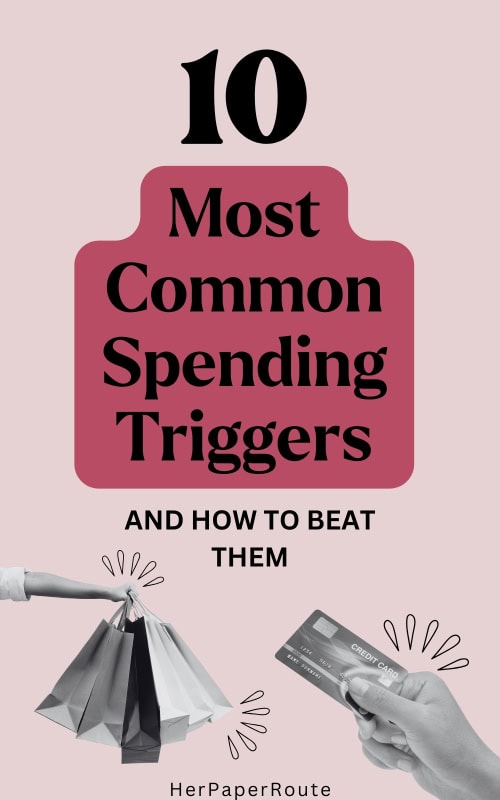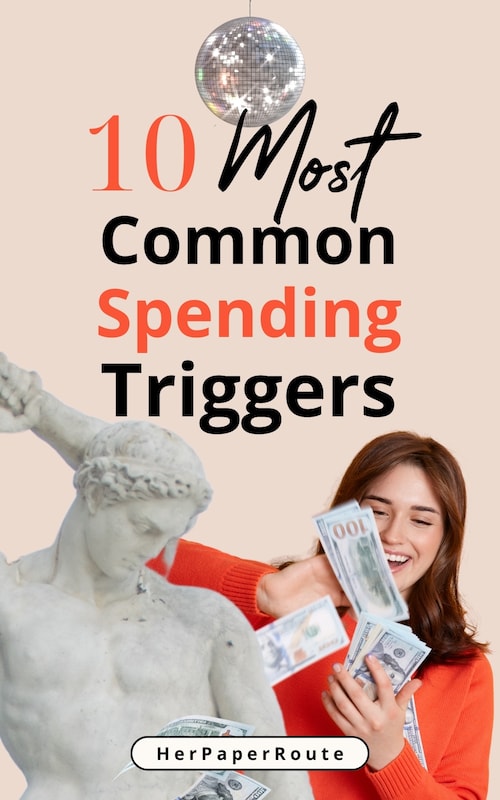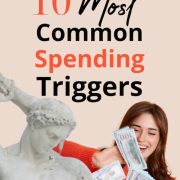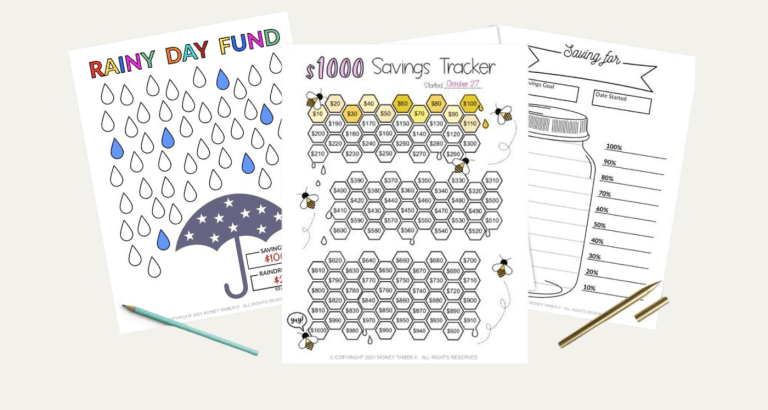10 Most Common Spending Triggers and How to Beat Them

Are you aware of the most common spending triggers? You should be, if getting on top of your financial situation is important to you.
Spending money can be fun. So much fun that sometimes you might attach emotions like happiness to shopping. But it also has consequences.
As an affiliate partner of various brands and sponsored content, HerPaperRoute may earn commission on qualifying purchases. Disclaimer
We all make purchases that we regret sometimes. In fact, if you look around your home, you will probably find many things that you could have done without.
Spending money is not necessarily bad, but it is essential to control how and when you spend. You can do this by identifying your spending triggers and discovering how to move past them.
What are Spending Triggers?
Spending triggers can be many things. They are emotions or circumstances you find yourself in that cause you to want to spend money.
This happens when you let the spending trigger control your actions. While this can seem negative, the reality is many people have spending triggers, but you can overcome them.
When Might You Encounter a Spending Trigger?
This depends a lot on you. Everyone’s money temptations are unique. You may feel emotionally vulnerable before spending.
These feelings may cause you to either run away and avoid through spending or pursue a sense of happiness through spending.
What Causes Emotional Spending?
Many things may make you want to spend money based on emotion. Emotional spending can be a way to deal with stress, nostalgia, or insecurities. I’ll talk about some specific ones here.
Emotional Spending Psychology
Overall, emotional spending is usually because you feel a negative emotion or try to preserve a positive one. Emotions can play a big part in spending.
To escape negative feelings, you may spend money on something impulsively. It’s also possible that by buying items, you are chasing a positive feeling.
Either way, spending emotionally is an unhealthy habit. It puts your feelings in control of your wallet, which is never good.
While feelings are not bad, it is better to have self-control and allow that to be the guiding force with purchases instead of emotion.
Emotional Spending Examples
Example 1:
You have an argument with a friend. You are feeling guilty about arguing and angry about whatever the argument was about.
You go to the mall, intending to just window shop, but add items to your cart. Before you know it, you’ve blown through $100 that wasn’t in your budget because you wanted to distract yourself from your feelings.
Example 2:
You are at a Christmas market. It’s snowing, and everything looks beautiful. You associate Christmas with positive things.
You begin to stop at a few craft booths, and you buy several items because of nostalgia or the joy of the moment.
You forget that you don’t need any more Christmas decorations. When you get home, you realize you already own several similar items, but you got caught up in the moment.
How Do You Avoid Spending Triggers?
Since spending triggers are real, how can you structure your shopping and budgeting to avoid them? They are different for everyone, but I’ll talk now about some ways to prevent some common ones.
1. Know Your Triggers
As I said, spending triggers are unique for every person. You need to identify your own.
To do this, think back about your recent purchases. If you don’t remember, look at your bank statement for the last couple of months. Look for any purchases that were not bills or necessary expenses, and think about why you bought these items.
Just because a purchase is not a necessity does not mean it was emotional spending. You need to try to remember how you were feeling at the time.
After thinking about this, you may start to see a pattern. Do you spend when you’re bored? Maybe it’s when you are so busy that you buy things impulsively.
Over the next couple of weeks, notice any time that you feel like running to the store or want to buy something, even coffee, without a clear purpose. Take note of how you feel at the time.
Is it positive or negative? Is the purchase in your budget? These questions will help you identify spending triggers.
2. Delete Shopping Apps from Your Phone
Today, shopping is easier than ever. And since you can shop on your phone, you can purchase things so quickly you may not even register that you bought something!
The average person has 4 shopping apps on their phone. To avoid spending due to emotion, delete these apps for now. It can only help, and you can always add them again later.
3. Unsubscribe from Store Emails
To remove the temptation to spend due to sales or email promotions, unsubscribe. If one of your spending triggers is finding a good deal, this can help a lot.
Don’t give yourself the chance to check out deals for your favorite stores, and you will save cash by not hearing about these “money savers.”
4. Leave Your Credit Card at Home
Your credit card might allow you to go over budget, even when you shouldn’t. If you leave your credit card at home, you won’t have the ability to spend more money than you want to.
Take just cash and your debit card with you when you’re out, and you are more likely to think of your budget and how much is in your account before you buy anything.
Related: Easy Guide for Starting Out with Cash Budgeting
5. Review Your Budget Regularly
The best way to know if you are sticking to your budget is to monitor it closely. Keep track of where you spend money and whether it matches what your budget says.
Your budget can also help you save up for purchases you really want while protecting you from overspending emotionally.
6. Enforce a Waiting Period on Purchases
This can help you to spend only on what you truly need or want. Give yourself an amount of time that you must observe before you make a purchase.
For example, 24 hours. If you want to buy something, you must wait for a full day before doing so. You will probably find that you don’t want most of the things you would have purchased. This can save you a lot of money.
How to Overcome Spending Triggers?
There are many spending triggers, but the following are common ones that you can easily overcome using this advice.
1. Boredom
Do you find that shopping is an exciting hobby you turn to when you have nothing else to do? This can be dangerous for your finances.
Instead of shopping to alleviate boredom, find a new hobby that is cheaper. You might take up yoga, running, painting, or even a side hustle. When boredom strikes, turn to your new hobby to prevent spending.
2. Lack of Confidence
Maybe you feel that you are not as good as others if you don’t spend money or buy the latest things. But if you are comfortable with who you are, you can avoid emotional spending.
You are better off if you don’t need to buy items to make up for your lack of confidence.
3. Retail Therapy
This is an extremely popular spending trigger. Retail therapy is a well-known way to put off sad, anxious, preoccupied, or negative feelings about something.
Although shopping is fun and can be convenient during times of stress, it does not solve problems. Remember to avoid spending when you are feeling negative emotions.
4. Jealousy
It’s easy to look at what others own, like a new car, house, or fancy clothes, and want it for yourself. Feeling jealous is a big motivator for buying things.
You may want to buy to show off to others or stop yourself from feeling jealous of what they have.
First, remember that you don’t know your friends and neighbors’ financial situation. They may be in a lot of debt to afford the nice things they have.
But second, understand that other people’s lives are none of your business. What they buy should not influence how you spend, because you are working on your own financial journey, not their’s.
5. Sales
This can happen any time, but it is widespread around the holidays. Everywhere you look, from TV to emails, you will find that some store is having a sale.
Many people think that a sale saves them money. But here’s what they don’t realize: A sale can actually cost you more money if you don’t need the item and it isn’t in your budget.
If you plan to spend nothing and spend $50 due to a sale, you still overspent and gave in to a spending trigger.
Instead of spending, ask yourself, do you really need this item? Or do you just want it? Next, remember that there will always be another sale.
Make sales work for you by saving up for things you need or want and then waiting for them to go on sale. Then you truly are saving money.
Related: The Real Meaning Behind “The More You Buy, The More You Save”

6. Friends
Maybe you spend money going out for dinner or drinks or paying for activities to do with your friends. But buying things you can’t afford will only cause stress and make it more challenging to spend time with people if money is always a factor.
Instead of spending, find real ways to connect with your friends. They probably can’t afford to spend the extra money, either!
Try inviting them over for coffee or a game night, training for a 5K together, or cooking dinner at one of your homes.
7. Happiness
If you are feeling happy, learn how to enjoy the moment without spending anything. You may think that purchasing something will help the feeling of joy last longer.
But really, sticking to your budget will bring you more peace. The next time you are tempted to spend your cash unnecessarily, stop to appreciate what’s around you and why you feel happy at this time. Then find ways to enjoy it without a purchase.
8. Sadness
If you are feeling sad, it can be tempting to make some new purchases. After all, they may help you feel better temporarily.
But money doesn’t buy happiness, and eventually, it will no longer bring joy to your life.
When you’re sad, learn to look to other things for support. Your family, friends, faith, therapy, and other things can help you move past the sadness without giving in to spending.
9. Guilt
You may spend money when you feel guilty. This can come from a lot of things.
One example is a tendency to buy something for family members because you feel guilty about not spending enough time with them. Of course, there are many other examples.
Get to the bottom of why you buy things out of guilt. Then learn to deal with those emotions instead of allowing them to be a spending trigger.
10. Anxiety
This is not always an obvious one, but anxiety can cause you to want to buy things. A big reason is that it distracts you from your anxiousness.
When you are at the store or acquiring a new purchase, you may not have time to be stressed about finances or other matters. But the anxiety may get worse if you use it as a spending trigger.
Instead, get to the real issues behind the anxiety and find a healthy way to handle them without spending.
What Triggers Do You Personally Have That Make You Want to Spend?
Spending triggers are incredibly varied. You may find that you related to some from this list. Or maybe yours are entirely different.
Whatever they are, it’s essential to identify your spending triggers and learn better ways to handle those emotions rather than buying something.
Once you know about the feelings that make you want to shop, you are more likely to control them. When you control your spending, your budget will be better, and you will likely feel better.
These are the Most Common Spending Triggers and How You Can Beat Them
These spending triggers are very common, and many people may struggle with overspending due to these emotions. But you can absolutely overcome your bad spending habits and make better choices for your future.
You just need to know what makes you want to spend and how to tell yourself no. This will allow you to make the best financial decisions you can without thinking about how emotions might trip you up.
Related Articles:

Follow along on Instagram!










![Can You Lose Money In A Roth IRA? [And Ways To Prevent This] 12 An envelope with cash inside and the words Can You Lose Money In A Roth IRA printed on the top](https://herpaperroute.com/wp-content/uploads/2021/11/Can-You-Lose-Money-In-A-Roth-IRA-768x410.jpeg)